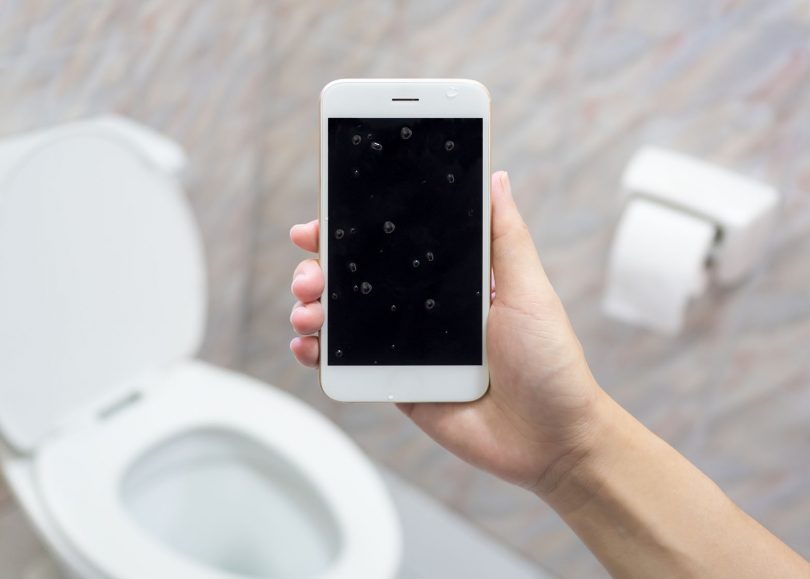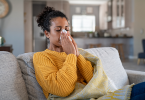Ready to be grossed out?
It depends on how clean the toilet is, but in most cases, your cell phone carries 10 times more bacteria than the average toilet seat, according to researchers.
But wait. Before you throw away your phone in disgust, know this: There are actually many items we come in contact with every day that are teeming with germs. We don’t have to worry about most of them; bacteria surround us every day, and most don’t make us sick. Researchers also tell us that exposure to bacteria—particularly when we are young—actually helps us build up our immune systems.
The problem is when we come in contact with certain viruses like flu or bacteria in raw food like chicken—which is why it might be a good idea for you to take a closer look at these seven items at home and at work.
1. Cell phones:
The problem with cell phones is that we touch them with our hands—all the time—and as a result, our hands can transfer bacteria onto them. Even worse is when we use or set our phones down in public bathrooms since germs are released when the toilet is flushed. Stay healthy: Use a microfiber cloth regularly; the friction alone removes many germs! Or gently wipe your phone with a cloth dipped in a solution of 60 percent water and 40 percent rubbing alcohol.
2. Buttons:
Buttons in public places, like elevator buttons or the ATM keypad, come in contact with hundreds of clean and not-so-clean hands every day. And public places are where most people tend to be exposed to flu and other germs. Stay healthy: Just use hand sanitizer or, even better, wash hands when you get to the office or home.
3. Dish sponges:
Because they come in contact with surfaces that have touched raw food, grease and more, kitchen sponges can get pretty grimy. Some estimates say that these sponges carry as many as 10 million bacteria per square inch. Stay healthy: Toss your sponge in the dishwasher regularly, and also make sure to replace often.
4. Shopping carts and reusable grocery bags:
We never used to be OCD about this, but if you think about it, shopping carts come into contact with raw meat all the time. Reusable grocery bags are at risk, too. Stay healthy: Use the wipes that most stores have available to clean off the cart handle. Wash your reusable bags regularly, or to be extra safe, ask that all raw meat be placed in a plastic bag instead.
5. Remote controls:
Researchers have found staph-causing bacteria on 14 percent of home remotes. Even worse, remote controls at hotels have been found to have more than 13 times the maximum level recommended for hospitals. Clean it: Use an alcohol wipe regularly at home, and when traveling, you can “MacGuyer” one by using Kleenex and a dab of hand sanitizer.
6. Cutting boards:
It doesn’t matter if it’s plastic or wood. E. coli or salmonella can both be commonly found on these surfaces due to their regular contact with raw meat. Stay healthy: Place plastic boards in the dishwasher, and handwash wooden boards with plenty of soap and hot water. For food safety, always prep your vegetables on a cutting board first, then put them on a separate surface, before prepping raw meat. Or use separate cutting boards and utensils for each.
7. Sink faucets and fridge handles:
Forty-five percent of kitchen sinks have coliform bacteria (compared to only 9 percent of bathroom sink handles), which can lead to intestinal illness. Refrigerator handles are also among the germiest places in the home. Stay healthy: When you’re doing your regular nightly clean-up, give faucets and fridge handles a swipe with a bleach wipe too.
Be germ smart
However, if all this talk of germy surfaces makes you want to douse everything in antibacterial cleanser, hold off. It’s actually just as bad—or even worse—to be too clean. Overuse of antibacterial products has been found to increase bacterial resistance—which means those nasty bacteria just got harder to get rid of.
Mom said it best: Simply washing your hands with soap and water remains your best defense when it comes to keeping you from getting sick from germs in your environment. Make sure to do it often, and do it right, by lathering hands for at least 20 seconds. Wash before and after preparing food, after using the bathroom or changing a diaper, taking care of pets or if they look dirty.





